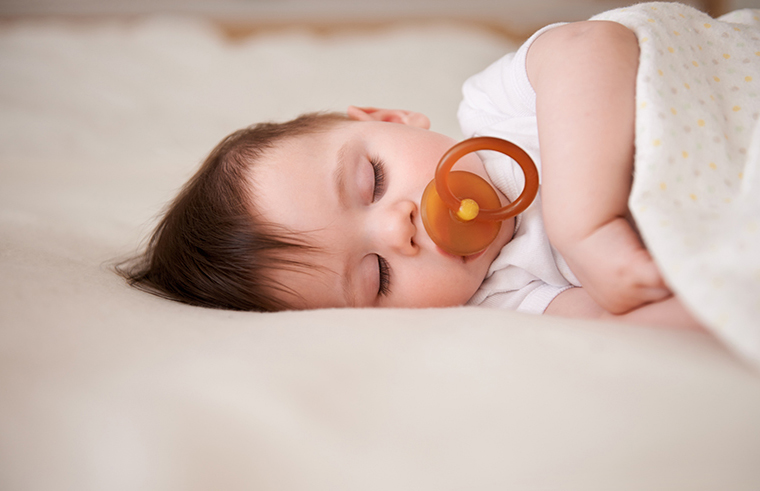When a baby is born, they’ll need to suckle on the breast or bottle for food. But when the baby has teeth, there are other ways of feeding the baby. The baby should learn how to use a teat cup and milk feeder, but will still often want their dummy in order to help them calm down or sleep at night. Here are some tips on when you can start helping your baby give up their dummy.
Giving your baby a dummy can be a lifesaver. Despite the taboos and judgment from the parenting police, there are many reasons why using a dummy can be helpful.
If you have a ‘sucky’ baby, a dummy can save your breasts from being constantly used as soothers. Or if you have a baby with tummy problems like wind or reflux, using a dummy can help because your baby will swallow more and this can help keep things down. And significantly, if your baby is a tricky sleeper, dummies can be a useful aid for naps and bedtime.
How do I know if it’s time to wean my baby off the dummy?
But at some point, that dummy has to go. Which can result in plenty of angst for parents around the when and how this is going to happen.
Firstly and most importantly, the good news: Paediatric nurse and Director of Baby Bliss, Jo Ryan, says that if your baby’s dummy isn’t causing you any problems, “It’s not really an issue and it’s up to you when you want to get rid of it.”
Sleep is the number one reason dummies may start to cause problems. While they can be helpful for young babies, as they grow, relying on the dummy use may actually start to disturb their sleep – the dummy falls out, they wake up, they can’t put that dummy back in their mouth themselves so they cry out to have it replaced.
Jo explains that this is a perfectly natural reaction, “Sucking can release a hormone that soothes babies. It’s why they like to suck to sleep – it releases those calm, sleepy hormones, which is why the associations with sucking on the boob, the bottle, or the dummy are really strong.”

Signs it may be time to wean your baby off the dummy
But if you start to notice the following signs, it may be time to ditch the dummy:
- your baby starts waking after every sleep cycle (about every 45 minutes)
- they won’t go to sleep without one
- The dummy stops helping them stay asleep
What’s the best age to wean my baby off the dummy?
At around four months of age, you may want to consider helping your baby let go of their dummy. This is the time when babies experience a sleep regression and by weaning your baby now, you may save yourself more work later on.
“The regression is caused by their sleep cycles becoming more cemented in the way they’re going to be for the rest of their babyhood,” explains Jo. As they grow out of the newborn sleeping phase, they also start to become much more aware of their environment.
“When they wake, they look around, they look for things, they might look for you, so often if the dummy has fallen out, they’ll wake up and they’ll cry, or need you to come to help them in some way. So what we do is we put the dummy back in and then it starts to become a bit more of a habit,” she says.
Sometimes dummy use doesn’t become an issue until your child is a little older – around 10-12 months – when you may find it’s disruptive to your child’s sleep.
“You may notice that they used to wake two times a night, that amps up to four times a night, and before you know it they’re waking every hour!” Jo explains. And no parent wants to be on dummy duty every hour through the night.
How to wean your baby off the dummy
There are two ways to help your baby let go of their dummy:
1. Stop using it altogether
If your baby is around four months, stopping completely may be smooth sailing, but if your child is close to 12 months or older, Jo recommends waiting until they’re about two, when they’re old enough for you to explain that you’re getting rid of the dummy.
2. Limit dummy use
To do this:
- If they wake up mid-nap, pat or settle them back to sleep any way you can, so they can learn to get back to sleep without a dummy in their mouth.
- If they’re already rolling or sitting up, you can replace their dummy with another sleep-aid like a comforter. Small blankets like the Little Haven Baby Nursery Security Blanket do the job perfectly – it’s just the right size, shape, and softness for babies to snuggle down with.
How long will it take to wean my baby off the dummy?
Jo predicts it will probably take around 2-5 days for your baby to adjust to sleeping without their dummy. And by consistently repeating these techniques, your baby will soon learn to adapt and be able to sleep dummy-free.
Conclusion:
baby to give up their dummy All baby dummies should be used with adult supervision. And if the baby is rolling, sitting, or crawling it may be time to try other sleep aids like a small comforter.
It will probably take around two weeks for the baby to adjust and remove the need for a dummy by consistently repeating techniques until they learn how to adapt without one.






